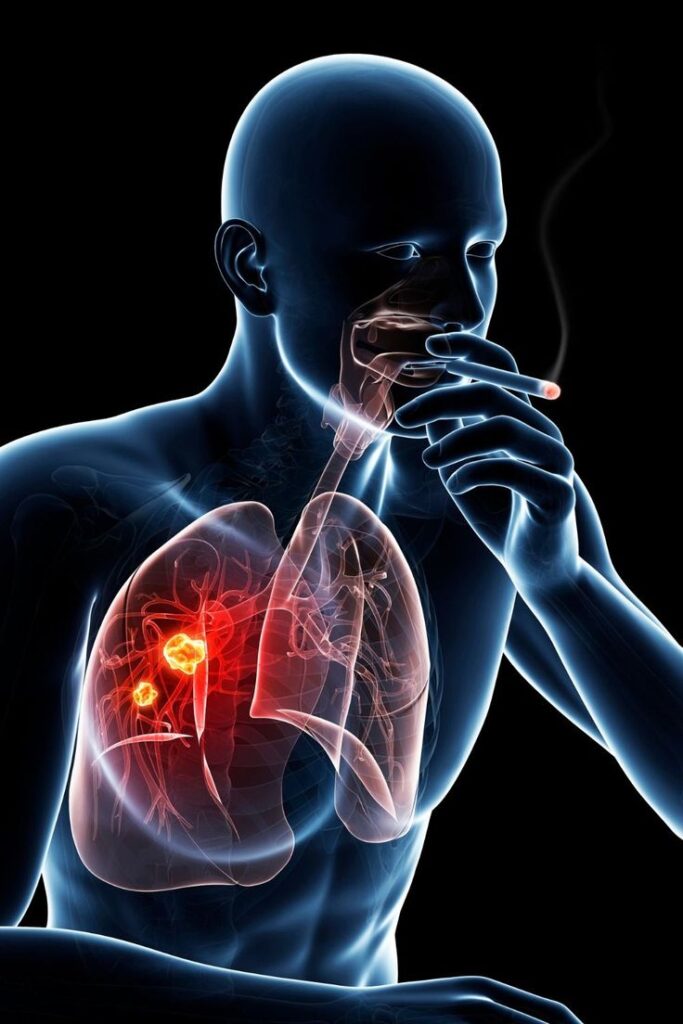
Medical & Health Editor – SBKI News
Published: August 1, 2025
When a 34‑year‑old Bengaluru IT professional and a 43‑year‑old teacher from Panipat were diagnosed with lung cancer, doctors were shocked. Neither smoked, both ate homemade food, and exercised regularly. So what triggered their disease?
 Rare Genetic Factors: EGFR Mutation Detected
Rare Genetic Factors: EGFR Mutation Detected
Dr. Raman Narang, hematologist at Andromeda Cancer Hospital in Sonipat, confirmed that the Panipat teacher carried an EGFR mutation—a genetic abnormality strongly linked to lung cancer in non‑smokers, especially among Asian women. EGFR mutations occur spontaneously—not inherited—and accelerate cell growth in lung tissue, leading to cancer even absent traditional risk factors .
The Bengaluru case also revealed a specific mutation in a lung specimen. Both patients were immediately offered targeted oral therapy, such as EGFR tyrosine‑kinase inhibitors. This treatment—far less toxic than standard chemotherapy—showed early success: one patient’s tumour shrank by 60%, the other saw significant reduction within months, with few side effects.
 Environmental Risks: Pollution Is a Growing Threat
Environmental Risks: Pollution Is a Growing Threat
Even though both patients lived healthily, severe air pollution in urban regions such as Bengaluru and industrial areas around Panipat are likely contributors. Expert pulmonologists link long-term exposure to PM2.5, NO₂, vehicle fumes, and industrial dust to rising lung cancer rates in non-smokers .
According to The Lancet Respiratory Medicine, nearly half the lung cancers globally among non-smokers now stem from polluted air . In India, exposure to radon gas, construction dust, and indoor pollutants—even incense or mosquito repellents—have been strongly implicated .
 Occupational Exposure: Hidden Carcinogens
Occupational Exposure: Hidden Carcinogens
Despite exercising and home‑cooked meals, both individuals worked in environments that may have exposed them to carcinogens like silica, asbestos, diesel fumes, or chemical solvents. Chronic low‑level exposure—especially in IT infrastructure and school buildings—could have silently damaged their lungs over the years .
 The Rising Trend: Non-Smokers Facing Cancer
The Rising Trend: Non-Smokers Facing Cancer
ICMR reports signal a shift: two out of every ten lung cancer patients in India today are non‑smokers—up sharply from only one in ten a decade ago ({{cite_turn0search6}}). On average, non‑smoking lung cancer patients are diagnosed a decade earlier than smokers, especially women in their 40s and 50s
A landmark Global Lancet study identified lung cancer in never‑smokers as the fifth leading cause of cancer mortality worldwide—and rising fast in countries like India
 Symptoms Ignored: Delays in Diagnosis
Symptoms Ignored: Delays in Diagnosis
Both patients initially dismissed symptoms like persistent cough, mild chest discomfort, and fatigue—symptoms often misdiagnosed as asthma or seasonal flu. Medical experts warn these “silent signs” are common in non-smokers and often lead to late diagnosis. Tragically, in India over 40% of lung cancer cases are confirmed only at advanced stages, making effective treatment more difficult .
 Early Detection & Treatment: Hope at Last
Early Detection & Treatment: Hope at Last
Doctors emphasize the importance of low‑dose CT scans for early screening, even for non-smokers with persistent respiratory symptoms or pollution exposure. Both the IT professional and Panipat teacher were diagnosed after CT scans and biopsies—leading swiftly to targeted therapy.
These precision therapies—available in urban medical centers—can drastically improve outcomes with fewer adverse effects than traditional chemotherapy ({{cite_turn0search0}}{{cite_turn0news14}}).
 Summary of Risk Factors & Protecting Health
Summary of Risk Factors & Protecting Health
| Risk Factor | Relevance in These Cases |
|---|---|
| Genetic mutation (EGFR) | Present in both patients; major driver of non-smoking lung cancer |
| Ambient air pollution | Urban pollution likely contributed to lung DNA damage |
| Indoor pollutants & secondhand smoke | Possible chronic exposure at home or office |
| Occupational carcinogens | Potential exposure to chemical or dust at workplaces |
| Delayed medical attention | Symptoms masked by lifestyle / earlier assumptions |
 Why These Cases Matter
Why These Cases Matter
Myth Debunked: Lung cancer is not limited to smokers. Cases like these reinforce that non-smokers—even health-conscious ones—are increasingly at risk.
Environmental Urgency: India’s polluted air, both outdoors and indoors, is emerging as a lung cancer driver, requiring policy reforms and public awareness.
Power of Precision Medicine: Mutations such as EGFR open new treatment pathways with targeted drugs—underscoring the importance of genetic testing.
Need for Early Detection: Regular screening beyond conventional risk groups is essential, especially for persistent respiratory symptoms.
 Expert Perspectives
Expert Perspectives
Dr. Rajeev Vijayakumar of Gleneagles BGS Bengaluru highlights that urban pollution and household chemicals like incense and mosquito coils pose serious long-term cancer risk .
Dr. Garde at Gleneagles Hospital in Mumbai notes the shift: “Now out of 10 lung cancer patients, five are non-smokers”—a stark contrast to the past when smoking accounted for nearly 80% of cases.
On World Lung Cancer Day, oncologists across India have emphasized myth-busting: lung cancer can affect anyone—young or old, smoker or not—and targeted treatments now offer better outcomes.
 Conclusion: A Silent Epidemic with Treatment Hope
Conclusion: A Silent Epidemic with Treatment Hope
The cases of the Bengaluru IT professional and Panipat teacher serve as loud warnings: even diligent, healthy individuals are not immune to lung cancer. Genetic factors like EGFR mutations, coupled with environmental pollutants and workplace exposure, can quietly trigger disease.
Yet their stories also offer hope—quick diagnosis, molecular testing, precise oral therapy, and monitoring can reverse what once seemed inevitable.
As India braces for a projected seven-fold rise in lung cancer by 2025, especially among younger non-smokers, public health systems must prioritise pollution control, indoor air quality, genetic screening, and awareness campaigns.
Ultimately, these cases underline that vigilance, early action, and modern treatment can turn tragedy into survival—even when smoke is never a factor.
Unexpected Lung Cancer in Healthy Non‑Smokers: Genetic Mutation & Pollution Blamed
Read more about health of the world
